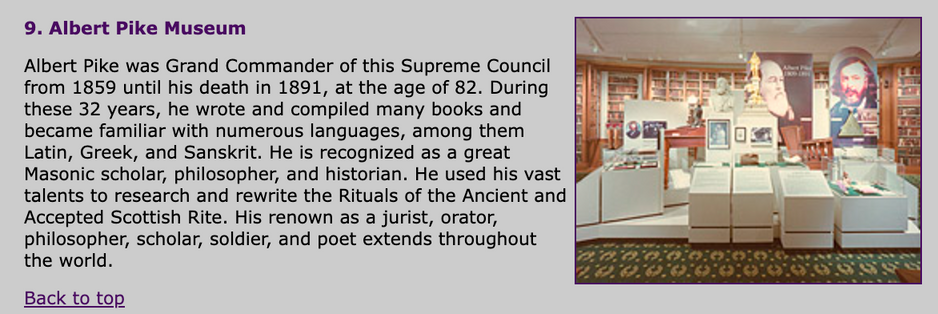Dear Mr. Mason
HOW TO GREATLY IMPROVE
SCOTTISH RITE FREEMASONRY
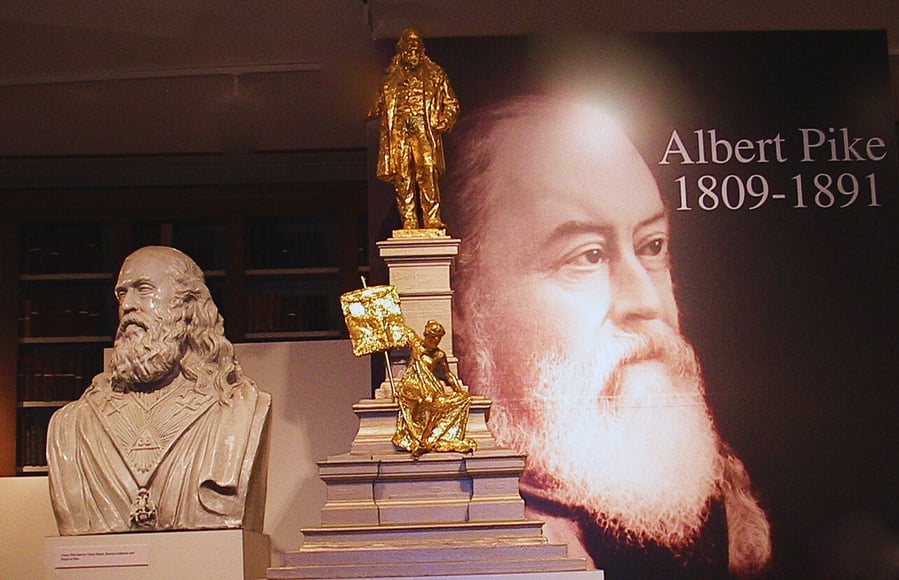
I am writing to you as a friend.
I admire many things that Masons do, but I think I can point out some changes that would greatly improve Freemasonry for you and for future generations of Masons. I am not a Mason, but Freemasons have been in my family for generations. My grandfather taught Scottish Rite Freemasonry for many years, and I have been a student of Freemasonry for many years.
First, Mr. Mason, let me thank you for all the many good works Freemasons of all degrees have done for centuries here in America. Since the first American lodge was organized, men like you have served the needy, and children in particular, with great distinction. The free hospital care you give to child burn victims is especially noteworthy!
I thank God for all the suffering you have relieved through your many years of charitable works. I am sure that many children and their parents owe you a great debt of gratitude for the help you have given them.
Thank you, also, Mr. Mason, for joining Masons so that you could form life-long friendships with other men in your community. Men need that kind of fellowship, don’t they? It strengthens men tremendously to have enjoyable and relaxing times with good, moral friends who will be there for them when they need them. What a gift real friends are! Your desire to form those kinds of enduring relationships with other men is very commendable. It’s easy for men to be loners, but men with close friends are probably happier, more compassionate and more productive members of a community. Men like that make a community stronger. Thank you for seeking that as a Mason.
I thank God for all the suffering you have relieved through your many years of charitable works. I am sure that many children and their parents owe you a great debt of gratitude for the help you have given them.
Thank you, also, Mr. Mason, for joining Masons so that you could form life-long friendships with other men in your community. Men need that kind of fellowship, don’t they? It strengthens men tremendously to have enjoyable and relaxing times with good, moral friends who will be there for them when they need them. What a gift real friends are! Your desire to form those kinds of enduring relationships with other men is very commendable. It’s easy for men to be loners, but men with close friends are probably happier, more compassionate and more productive members of a community. Men like that make a community stronger. Thank you for seeking that as a Mason.
Besides friendship, many men may also join Freemasonry to make good business and career connections. As friends and brothers, it is fitting that Freemasons look out for each other in the business arena as well as in other areas of life. In these uncertain times, it is very wise to form strong business alliances for mutual growth and profit. Such collaboration and mentoring among honest businessmen can only strengthen our local and national economies. Masons, like other fraternal organizations such as Kiwanis and Rotary, have contributed much to the financial and moral soundness of American businesses for many years.
There are certainly many more reasons we could cite to commend Masons. Many U.S. Presidents and other notable men from many professions have been Masons. That, too, says something very positive about Freemasonry. Many Americans today admire Freemasons. Like many other Americans, I have been a member of fraternal groups similar to Masons in some respects. I once served as President of a Kiwanis Club in my town. I still feel a sense of pride about how we were able to serve that small mid-western farming community.
I thank God for what Masons, Kiwanis, Rotary, Elks, and Moose clubs have done as community fraternal groups. My life has been wonderfully enriched by participating in such groups.
But, Mr. Mason, despite all the admirable qualities I have mentioned above, I could never join you as a Mason because of one aspect of Freemasonry: the official, national religious teachings of Freemasonry developed by Albert Pike, one of the main leaders of 19th-century American Freemasonry.
Mr. Mason, please allow me to explain:
I am a serious student of religion. I respect people who take religion seriously because I believe that the spiritual world is very real, that God is real and that we will all answer to Him one day for how we have lived. I understand that Masons feel the same way about religion. That is why every Mason must believe in a Supreme Being in order to be accepted into Freemasonry.
Twenty-five years ago, after studying Greek, Hebrew and Latin, I received a master’s degree in religion, and later, I started working on a doctoral degree in religious studies. I have taught religion in various ways for over 20 years, including teaching world religions at the college level after traveling all over the world and studying various religions.
I am also a monotheist.
Jews, Christians and Muslims represent the largest groups of monotheists in the world. A monotheist believes in the existence of one (“mono”), true God (“theism”) and by definition, all other gods are false gods. Polytheists believe in many (“poly”) gods. The worst sin a monotheist can make is to become involved with or promote other gods. Monotheism, by definition, is exclusive. It demands faith in and service to only one God.
The Jewish scriptures clearly show over and over that God commanded His followers to worship and serve only Him.
The same is true for followers of Islam. The God of Islam would feel the same way about their followers being involved with or promoting other gods. Today, in many Muslim lands, Muslims still try to kill other Muslims who turn from their God, Allah, to follow another god. So, according to their respective scriptures, Jews, Christians, and Muslims are taught that affiliation with other gods is anathema to their God. It is the worst form of betrayal to their God.
Mr. Mason, would you agree that most Masons in America are monotheists?
I suspect they are. They would also say that they have no intention of becoming affiliated with other gods. I can’t imagine anyone joining a lodge for that reason. As you know, Freemasonry wasn’t founded for that reason. Yet, I hope to show you in this letter that in the last 150 years, the national leaders of Freemasonry in America have clearly linked Freemasonry with multiple gods.
Before I begin, Mr. Mason, let me say that if you are not a monotheist, the rest of this letter may not interest you. I respect your freedom of choice to follow whatever gods you choose. But if you say that you are a monotheist, I want to help you see that Freemasonry, as it is represented today in America by the national leaders of your Supreme Council, is a great threat to your religious beliefs as a monotheist. My purpose is to help you be an informed, honest believer in whatever monotheistic religion you follow.
How Albert Pike Changed Freemasonry
The best research shows that Freemasonry in America was a monotheistic,
Christian fraternal order that originated in Christian Europe
and continued until the middle 1800s.
Then Albert Pike came along.
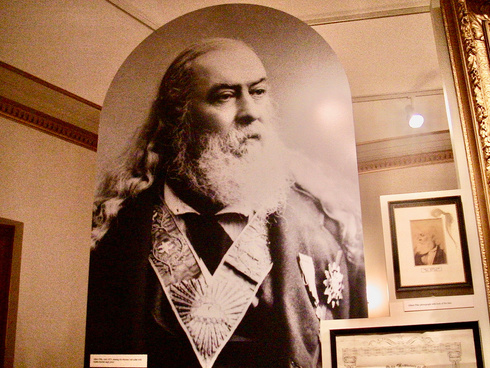
From his humble beginnings as the son of a Christian shoemaker, Pike became the most powerful and influential Mason America has ever had. Brilliant and innovative, he rewrote the rituals for all 32 degrees of Scottish Rite Freemasonry in America with very non-Christian language.
Pike also became the Grand Commander of the Supreme Council of Scottish Rite Freemasonry in America for 32 years, from 1859 to 1891. His word was law within Freemasonry at that time.
His religious views, which most people in America would consider bizarre, are still affirmed by your national leaders. Your Supreme Council enthusiastically promotes him as one of the prime leaders and thinkers in all of American Freemasonry. Never heard of Albert Pike in your lodge meetings?
Probably not.
Your Supreme Council Thinks a Lot of Pike!
See for yourself. Have you ever visited your House of the Temple in Washington, DC?
This is the headquarters of the Supreme Council, 33°, Scottish Rite of Freemasonry, Southern Jurisdiction, USA. In many ways, this is the house that Pike built with his writings and his library. Let’s take a short tour of your national Temple.
The Scottish Rite Temple is located in Washington, D.C. at 1733 16th St., NW, between R and S Streets. It is open 7:00 a.m. to 5:00 p.m. (Monday – Thursday : Closed Friday) with M-Th tours from 10:00 a.m. to 3:30 p.m. Telephone Number: (202) 232-3579
You can take a tour of the House of the Temple. It is quite impressive. There you will see Albert Pike immortalized and honored as no other Masonic leader of the past or present has ever been honored. In fact, it seems that your national leaders believe that Pike may be the most important figure in American Freemasonry when one considers all the unique tributes to him there.
How Your Supreme Council Honors Pike!
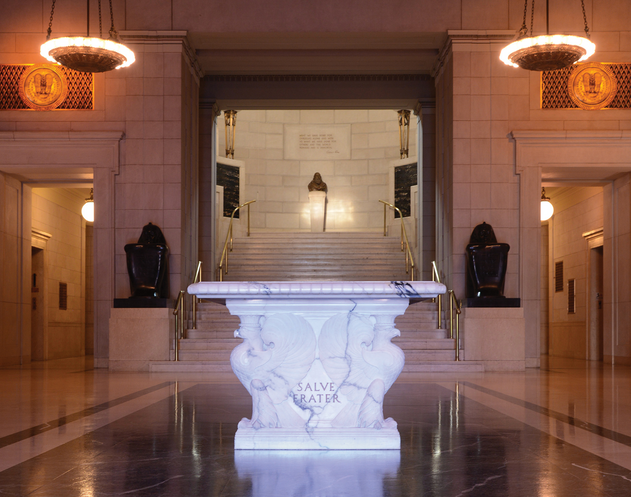


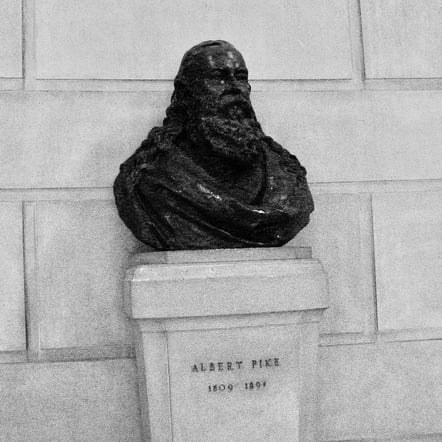

Pike’s Bust
As you enter the House of the Temple, you come to the Grand Staircase. In the center of that staircase is a life-size bust of Albert Pike in the far rear, as seen in the picture above left . A close-up of the bust is on the right.
No other Masonic leader is as honored as Pike is by a bust in such a prominent place. Its location insures that that almost every person will pass by that bust of Pike in order to go up to the Temple Room with its massive stone Altar and Grand Commander’s Station. Symbolically, the placement of that bust says that every Mason must acknowledge Pike if he is to enter into Masonry’s highest levels of leadership.
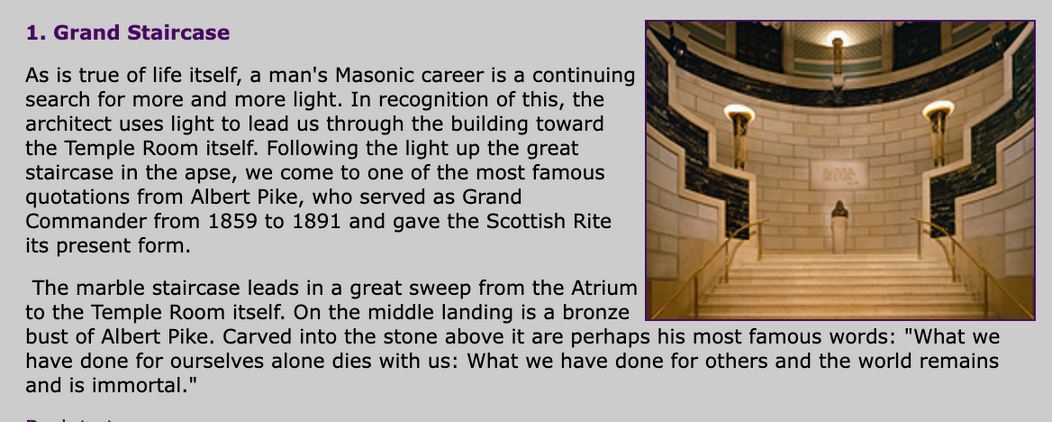
Here’s what the website of the House of the Temple used to say in 2007 about Albert Pike under the picture of that bust. (Since 2007, the Supreme Council has tried to highlight Pike less on their website since they have become more aware that what Pike taught and represents is one of Freemasonry’s Achilles heels.)
“As is true of life itself, a man's Masonic career is a continuing search for more and more light. In recognition of this, the architect uses light to lead us through the building toward the Temple Room itself. Following the light up the great staircase in the apse, we come to one of the most famous quotations from Albert Pike, who served as Grand Commander from 1859 to 1891 and gave the Scottish Rite its present form.” (Emphasis mine)
Pike “gave the Scottish Rite its present form.” As we shall see, Pike is the preeminent architect of Scottish Rite Freemasonry in America today… and that is not good news for any monotheist who is a Mason!
The House of the Temple website explains why this museum was dedicated to Pike in 2007 :
“He is recognized as a great Masonic scholar, philosopher, and historian. He used his vast talents to research and rewrite the Rituals of the Ancient and Accepted Scottish Rite” (Emphasis mine)
Other famous people (like Burl Ives and Robert Burns) have unique rooms dedicated to them in the House of the Temple. Still, of those with these unique rooms, only Pike is hailed as the great architect of Scottish Rite American Freemasonry throughout the Temple.
Pike’s Library
Although not called by his name, Pike's personal collection of thousands of books formed the original nucleus of the Library of The Supreme Council at the present House of the Temple. Pike’s books began that Library.
Pike’s Tomb
Freemasonry leaders got a special Act of Congress passed in order to re-bury Pike’s remains within the temple itself. There is another life-size bust of Pike there. Flowers are still regularly placed there during the Biennial Session year.
Pike’s Statue
The Scottish Rite also facilitated the erection of a full-size statue of Pike as a Confederate General at the corner of Third Street and Indiana Avenue, Northwest, in Washington, D.C., near the U.S. Department of Labor building. This was the only statue of a Confederate general in Washington. In 2020, it was torn down by protestors.
Pike’s Endorsements
Dozens of Masonic writers consistently extol Pike with the highest honors---more than they give to any other leader in Freemasonry!
One such was Mason Carl Claudy, who in 1925 called Pike “Greatest of the Masons as he was greatest of the mystics.”
C. Fred Kleinknecht was the former Sovereign Grand Commander of Scottish Rite Freemasonry in America. He is such an important Masonic leader that he also has an entire room dedicated to him in the House of the Temple. He wrote in the forward to Rex Hutchens’ A Bridge to Light (Published by your Supreme Council in 1988), “The apex of our teachings has been the rituals of our degrees and Morals and Dogma, written by our beloved Sovereign Commander Albert Pike” (p. vii). Dozens of Masonic writers would heartily agree with that opinion of Pike.
Pike’s Books
2003, the Supreme Council sold on their website a starter "Scottish Rite Library" of 14 key books that included:
- Hutchens and Monson, The Bible in Albert Pike’s Morals and Dogma
- Hutchens, A Glossary of Morals and Dogma
- Hutchens, Pillars of Wisdom: The Writings of Albert Pike
- Pike, Book of the Words
- Tresner, Albert Pike, The Man Beyond the Monument
All these are in addition to the many books they sell on Scottish Rite rituals which Pike himself authored. It is not an overstatement to say that if Scottish Rite Freemasonry has a modern founding father, it is Albert Pike.
I encourage you as a Mason to read these books by or about Pike, especially Morals and Dogma, his most famous book. As you may know, until 1973, Morals and Dogma was given to every Mason after completing the 14th degree.
Masonic leaders later admitted that the average Mason could not really understand the very complex religious teachings of Morals and Dogma. Hence, the tradition of giving it to 14th-degree Masons ended after 1973. But, your Supreme Council highly recommends it. It is still sold on their website.
You can read it online for free at Body or buy a copy online from the House of the Temple store at their website at Body or buy a used one very cheaply online. There is also a leather-bound edition. This 1100-page book is so important that it has been released in a new, updated edition that the 2012 website describes as "A Masonic classic! The fundamental sourcebook of Scottish Rite philosophy..."
Albert Pike’s Legacy in American Freemasonry
Pike could easily be considered the spokesman for American Scottish Rite Freemasonry for all the above-mentioned reasons. At the least, it is hard to imagine how any prominent Masonic writer could contradict Pike’s central teachings and be considered a faithful Mason.
The Supreme Council certainly has immortalized Pike as their preeminent Masonic thinker.
Such was Pike’s impact that American Freemasonry can be divided into two periods: before Pike and after Pike. But few Masons realize how Pike radically changed American Freemasonry.
This dramatic shift in American Freemasonry directly reflected who Pike was. For reasons not fully understood, Pike rejected much of his Christian upbringing and became an ardent student of Eastern religions, pagan mythology, occult practices and especially Hinduism.
By 1874, Pike had written over 12,000 pages of commentary on the Hindu scriptures alone. Morals and Dogma shows a vast knowledge and appreciation for many other religions that Pike has woven into many of the degree rituals of Freemasonry.
If Pike is the leading spokesman for American Freemasonry, Morals and Dogma is undoubtedly his main book of teachings. The website of your national leaders refers to this book as “the great cornerstone of our Order, Albert Pike’s Morals and Dogma…
In summary, Morals and Dogma is:
- The main source book for all the rituals in Scottish Rite Freemasonry. Its chapters are the full text of the lectures assigned to each of the 33 degrees.
- At best, this is a book of intensely polytheistic, religious mysticism. In it, Pike presents a kaleidoscope of confusing religious ramblings that defies description, combined with some comments about social and personal values that most people would already agree upon. Forgive me if that sounds harsh. As an experienced religion teacher, I know no other way to describe it.
- An unbelievable blending of almost every known form of religion, pagan mythology and religious symbolism.
- The pages of Morals and Dogma are almost an encyclopedia of pagan gods and goddesses, secret occult teachings from the murky past and one of the largest collections of obscure teachings on religious symbols from just about any religious group that ever existed—especially from the Far East!
Examples of Pike’s Polytheistic Ideas in Morals And Dogma
For example, on page 435 of the original edition, in the 25th degree, called The Knight of the Brazen Serpent, Pike mentions the pagan gods Osiris, Isis, Horus, Atys, Cybele, Adonis, Venus and “many other representative of the active and Passive Powers of Nature…”
- Many of those gods mentioned above are Egyptian gods. Pike writes about gods like these for another 88 pages, single-spaced, with no graphics! All this is for just one degree!
- Some of the names of these pagan gods are also embroidered on the special garments that the Mason receives as part of this degree. See a picture of this practice on page 213 in the original edition of A Bridge to Light--another Masonic classic. A 2010 edition on your Supreme Council’s website may also have it.
A Bridge to Light by Dr. Rex R. Hutchens, 33°, G.C. is Masonry’s official condensation of Morals and Dogma.
It contains the “Readers Digest” version of all 32 degrees for Masons. In it, Dr. Hutchens writes, “Some Islamic doctrine is presented through the re-creation of initiation in the elite group among the Druse, a quasi-Islamic religious sect living in the Lebanon area…”
Speaking of Islam, did you know that every Masonic Shriner takes an oath that concludes with, “ …and may Allah, the god of Arab, Moslem and Mohammedan, the god of our fathers, support me to the fulfillment of the same. Amen….”
According to their respective scriptures, the Deities of Jews, Muslims and Christians would be very angry with their followers for any allegiance, honor or support given to other gods! Serious penalties for such behavior are written in the respective scriptures for each of those three monotheistic faiths.
Lastly, Mr. Mason, why are Shriners forced to take an oath to Allah, the god of Muslims, for help as part of their ritual to become a Shriner?
Why is “Allah, the god of Arab, Moslem and Mohammedan” called “the god of our fathers” in the Shriner’s ritual?
Isn’t that an insult to Christians and Jews? Nowhere in the Jewish or Christian scriptures is “Allah, the god of Arab, Moslem and Mohammedan” mentioned or referred to as the “god of their fathers.” The Allah of Islam is considered a different god by Jews and Christians. To swear allegiance to Allah would violate the most basic tenets of Jewish and Christian faiths. They can only serve one God. Allegiance to any other god is the most serious sin a monotheist can commit!
To summarize, in his rewrite of the Masonic rituals, Pike has made Masonry as religious as any world religion I have ever studied. It has all the marks of a religion in Morals and Dogma. Pike claimed that Freemasonry was not a religion, but Morals and Dogma is one of the most religious books I’ve ever read. Pike has, in fact, written a very complex theology of how he views God and man’s relation to God. Remember, Pike wrote 12,000 pages of commentary on the Hindu scriptures. Pike was highly religious.
But, Mr. Mason, Masonry doesn’t need a theology to do good works and help one another to be better men and women, does it? Other fraternal groups like Kiwanis and Rotary have no theology, and they do much good for one another and for the community. Once you understand more about Pike's theology, you may understand why Freemasonry would be much better without it and why I cannot become a Mason.
Pike’s Theology in Morals and Dogma
Unfortunately, Pike has written some of the most offensive theology ever written by a national figure about the beliefs of Jews and Christians.
Here is one example from page 563 in the original edition that blends pagan and Satanic mythology with the Jewish and Christian scriptures and about Jesus. This is part of the full ritual lecture for the 26th degree, The Prince of Mercy. I quote it at length so you know I have not taken things out of context.
In this story, according to Pike, Laldabaoth represents the devil. Look at the incredibly offensive blending of religious ideas in this typical quote from Morals and Dogma: (Emphases mine)
“And the image of Laldabaoth, reflected upon matter, became the Serpent-Spirit, Satan, the Evil Intelligence. Eve, And the image of Ialdabaoth, reflected upon matter, became the Serpent-Spirit, Satan, the Evil Intelligence.
Eve, created by Laldabaoth, had, by his sons, children that were angels like themselves. The Spiritual light was withdrawn from man by Sophia, and the world surrendered to the influence of evil; until the Spirit, urged by the entreaties of Wisdom, induced the Supreme Being to send Christos to redeem it. Compelled, despite himself, by his Mother, Laldabaoth caused the man Jesus to be born of a Virgin, and the Celestial Savior, uniting with his sister, Wisdom, descended through the regions of the seven angels, appeared in each under the form of its chief, concealed his own, and entered with his sister into the man Jesus at the baptism in the Jordan.
Laldabaoth, finding that Jesus was destroying his empire and abolishing his worship, caused the Jews to hate and crucify Him; before which happened, Christos and Wisdom had ascended to the celestial regions. They restored Jesus to life and gave Him an ethereal body, in which He remained eighteen months on earth, and receiving from Wisdom the perfect knowledge (Greek—Gnosis), communicated it to a small number of His apostles, and then arose to the intermediate region inhabited by Laldabaoth, where, unknown to him, He sits at his right hand, taking from him the souls of light purified by Christos."
In summary, Pike says here:
- Laldabaoth, alias Satan, created Eve.
- Laldabaoth caused Jesus to be born of a virgin.
- Laldabaoth caused the Jews to kill Jesus
- Jesus sits at Laldabaoth’s right hand!
Are you offended that someone would claim that Satan orchestrated creation, the birth and death of Jesus and that Jesus is subservient to Satan in heaven?
I am! Any Jew, Moslem or Christian who is a Mason should also be deeply disturbed that Freemasonry uses such blasphemous theology in its rituals for the 26th degree of Freemasonry!!!
This is theological toxic waste! It has no place in your life or mine--or in Freemasonry!
I dare you to get a copy of Morals and Dogma and actually read it! Unless you are trained in world religions, you wouldn’t know what to make of most of it.
You can read it online for free at http://www.freemasons-freemasonry.com/apikefr.html
Yet, Morals and Dogma is easily the most revered book in American Freemasonry by your national leaders! Every Mason reaching the 14th degree got a copy until 1973. No other Masonic book has ever been given that honor. It is central to American Freemasonry, as your national leaders see it. It is Pike’s most significant work, and your national leaders admire no Masonic leader more than Pike!
Mr. Mason, I am sorry, but I have to tell you all this. But, If you are a monotheist, especially if you are a Jew or Christian, you need to be warned!
Pike Thinks Like a Hindu
Why would Pike write such radically polytheistic religious mysticism for men in the 1800s who were mainly American Christians?
The reason is that Pike’s understanding of God became more Hindu than anything else. He didn’t believe that any religion could adequately describe God since, as the Hindus believe, God is more a force than a personal being. Pike’s god was really unknowable, as Pike would describe it.
Therefore, he made a deliberate effort to synthesize all religions into one. Listen to what Pike says about religions on page 516 of Morals and Dogma in the original edition, as part of his lecture for the 25th degree:
“Every man, without knowing it, worships a conception of his own mind…Idolatry consists in confounding the symbol with the thing signified, the substitution of a material for a mental object of worship, after a higher spiritualism has become possible…and every religion and every conception of God is idolatrous, in so far as it is imperfect, and as it substitutes a feeble and temporary idea in the shrine of that Undiscoverable Being who can be known only in part…"
Since Pike doubted every religion, he went to great pains to show how similar and inadequate they all were in the hopes that Masons would join him in accepting the universality of all religions and the oneness of God in all religions. This is a very Eastern religious idea. The car sales pitch that says, “Their ad is our ad,” describes how many Hindus and some Buddhists view the gods of other religions.
Hindu leaders often say to Christians, “Your god is just another manifestation of our god, who takes many forms. So, you can worship your god and still join us since they are actually the same god!”
Pike’s theology =the theology of the Bahai Faith
The Bahai faith, an Iranian reform movement within Islam, was born in the 1800s just as Pike was writing Morals and Dogma. Their god is called Bahá'u'lláh. Although we do not know if Pike deliberately modeled his beliefs about God from the Bahai’s, the similarities are remarkable.
Here’s one quote from the official Bahai website https://bahai.org.mt/who-are-the-prophets/
“Moses, Jesus Christ, Muhammad, and Bahá'u'lláh were all different personalities, separate individual realities. Their oneness lies in the fact that each manifested and revealed the qualities and attributes of God to the same degree: the spirit of God which dwelled within any one of Them was identical to that which dwelled in the others.” (Emphases mine)
This is essentially what Pike came to believe and teach within Freemasonry! Incredible!
Freemasonry’s Theology = Pike’s
That’s why your national Masonic leaders could publish a Christian Bible in 1924 through the Holman Publishing Company entitled “Masonic Edition, Temple Illustrated, The Holy Bible, the Great Light in Masonry.” In the introduction to this edition, Rev. Joseph Fort Newton writes:
"For Masonry knows, what so many forget, that religions are many, but Religion is one—perhaps we may say one thing, but that one thing includes everything—the life of God in the soul of man, and the duty and hope of man which proceed from His essential character. Therefore, it invites to its altar men of all faiths, knowing that, if they use different names for the “Nameless One of a hundred names,” they are yet praying to the One God and Father of all; knowing that while they read different volumes, they are in fact reading the same vast Book of the faith of Man as revealed in the struggle and sorrow of the race in its quest of God." (Emphases mine)
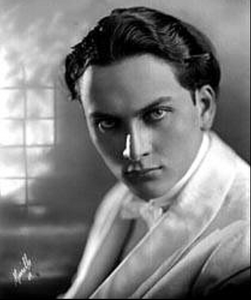
Other modern Masonic disciples of Pike, such as well-known Masonic author Manly Palmer Hall, on page 65 in his famous book, The Lost Keys of Freemasonry, now in its 12th printing, highlight this Hindu/Bahai theology in Freemasonry:
“The true Mason is not creed-bound. He realizes with the divine illumination of his lodge that as a Mason his religion must be universal: Christ, Buddha or Mohammed, the name means little, for he recognizes only the light and not the bearer. He worships at every shrine, bows before every altar, whether in temple, mosque or cathedral, realizing with his truer understanding the oneness of all spiritual truth. (Emphases mine)
Mr. Hall's thoughts were so appreciated by the Supreme Council of the Scottish Rite that Hall was recognized as a 33º Mason (the highest honor conferred by the Supreme Council of the Scottish Rite) on December 8th, 1973.
Four Key Questions for Every Loyal Mason
- Why have your national leaders built all the rituals and teaching foundations of Freemasonry on such an intensely polytheistic, religious book as Morals and Dogma?
- Why have they adopted Pike’s Hindu/Bahai religious point of view for American Masons?
- What sincere Jew, Christian or Muslim wants to support an organization that promotes such radical, polytheistic religious teachings---teachings that directly contradict those of his own monotheistic religion?
- What sincere Jew, Christian or Muslim Mason wants to be involved with or supportive of other gods? That is idolatry--the worst sin he can commit!
Conclusion: A Very Painful Picture
Albert Pike took a basically Christian-based organization and filled it with Eastern religious ideas that the Supreme Council of Scottish Rite Freemasonry unfortunately still promotes in every way possible.
His radical, religious interpretations of Freemasonry have become, at least for the Supreme Council of Freemasonry, the bedrock of what American Scottish Rite Freemasonry stands for: Eastern polytheism!
This is very spiritually dangerous for a sincere, monotheistic believer like you!
What You Can Do As a Loyal Mason
Now that you understand who Albert Pike was and what he did to American Freemasonry, you are accountable to your God for how you respond.
Talk to your personal spiritual leaders about the religious ideas Pike has brought into Freemasonry. Ask them if what Pike teaches is in harmony with your religious beliefs.
Ask them about the spiritual implications of supporting an organization that fully supports the polytheistic teachings of Morals and Dogma.
Ask them if it compromises your monotheistic beliefs to practice religious rituals using the names of multiple pagan gods and wearing garments with the names of pagan gods on them as you take solemn Masonic oaths!
Talk to your Masonic lodge leaders. Ask them to review this letter and to investigate these matters thoroughly using only Masonic sources from the House of the Temple in Washington, DC, your national headquarters.
Ask them why your national leaders are so committed to fully supporting Albert Pike’s strange religious teachings?
Ask them why the Supreme Council of Scottish Rite Freemasonry has not refuted or changed one word of what Pike said in Morals and Dogma!
Why have your Supreme Council, your state Lodge leaders, or even your local lodge leaders never questioned or refuted Pike’s radical and dangerous religious ideas?
When I ask Masons those questions, they just say that they personally do not believe what Pike teaches.
While that may be true, I am sure you are aware, Mr. Mason that:
- Your dues and your name are supporting an organization that does believe what Pike taught.
- You have taken solemn spiritual oaths of allegiance to that organization.
- You are spiritually, emotionally, relationally and financially committed to that organization.
- You and your brother Masons are that organization—collectively.
Silencio dabit consentio
That’s Latin for “Silence gives consent.”
If you do not openly object to what your national leaders teach and publish, then anyone could reasonably believe that you agree with them—especially on such a vital matter--- especially when you support them financially. Your silence is, in effect, condoning, allowing and supporting these radical religious teachings, which I am you were probably unaware of and personally opposed to.
I would also encourage you to visit the House of the Temple in Washington, DC and see for yourself how the national office has immortalized Pike. Then, discuss your concerns about his teachings with them.
Finally, I strongly urge you to work for reform within Freemasonry. You don’t need Albert Pike and his strange religious ideas to be a successful, productive, happy Mason. If Pike were removed from Masonry, more people might be inclined to join.
Ask the lodge and the national leaders to repudiate Pike and remove his teachings from modern Masonic rituals and symbols. The lodge would be much better without Pike’s radical, polytheistic, pagan religious ideas.
You will be safer spiritually by not supporting religious truths that directly contradict yours.
Mr. Mason—I wish you well.
If you can change the Lodge to reject Pike and his polytheistic teachings, you will have done an immense service to millions of monotheistic Masons who want nothing to do with pagan gods and their teachings.
You will bless them more and protect them from the spiritual dangers connected with Albert Pike's affiliation with other gods, which has filled Scottish Rite Freemasonry.
God bless you as you consider how to respond!
Your Friend,
Bill
